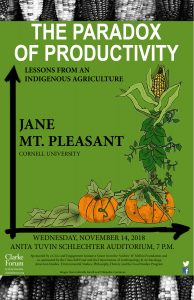 Cornell University
Cornell University
The Paradox of Productivity: Lessons from an Indigenous Agriculture
Wednesday, November 14, 2018
Anita Tuvin Schlechter Auditorium, 7 p.m.
Live Stream Link
Haudenosaunee (Iroquois) agricultural systems in the 17th and 18th centuries were three to five times as productive as their European counterparts at the same time. This lecture provides insights into this ‘paradox of productivity.’
This program is sponsored by the Clarke Forum for Contemporary Issues and a Civic Learning and Engagement Initiative Grant from the Andrew W. Mellon Foundation and co-sponsored by the Churchill Fund and the departments of anthropology & archaeology, American studies, environmental studies, philosophy, history and the food studies program. It is part of the Clarke Forum’s Leadership in an Age of Uncertainty Series and its semester theme, Indigeneity in the Americas.
Biography (provided by the speaker)
 Jane Mt. Pleasant, associate professor in the Horticulture Section of School of Integrative Plant Science at Cornell University, studies indigenous cropping systems and their productivity. Using her expertise in agricultural science, she examines agriculture from a multi-disciplinary perspective that includes history, archeology, paleobotany, and cultural/social anthropology. Although much of her work has focused on Haudenosaunee agriculture in the 16 through 18th centuries, more recently she has expanded her research to include pre-Columbian agriculture in eastern and central North America.
Jane Mt. Pleasant, associate professor in the Horticulture Section of School of Integrative Plant Science at Cornell University, studies indigenous cropping systems and their productivity. Using her expertise in agricultural science, she examines agriculture from a multi-disciplinary perspective that includes history, archeology, paleobotany, and cultural/social anthropology. Although much of her work has focused on Haudenosaunee agriculture in the 16 through 18th centuries, more recently she has expanded her research to include pre-Columbian agriculture in eastern and central North America.
Mt. Pleasant received her B.S. and M.S. from Cornell University and her Ph.D. (in soil science) from North Carolina State University. She is of Tuscarora ancestry.
